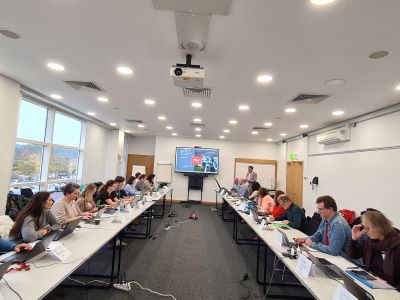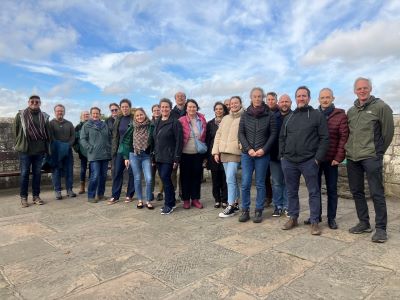
29th Meeting of the Panel on Quarantine Pests for Forestry
York (GB), 2024-10-16/18
The EPPO Panel on Quarantine Pests for Forestry met on the 2024-10-16/18 in York (GB). The scope of this Panel covers risk assessment and management to prevent the introduction and spread of quarantine pests of forest trees to support NPPOs in their work. The meeting was hosted by the United Kingdom Department for Environment Food and Rural Affairs (DEFRA).


The EPPO PRA for Ceratocystis ficicola (Ascomycota: Ceratocystidaceae), a causal agent of vascular wilt of fig trees, was presented to the Panel for information and discussion.
The DEFRA (GB) Rapid PRA on Phytophthora pluvialis, prepared in 2022, and additional information collected since the previous meeting of the Panel were discussed to consider the need to produce a PRA report covering the whole EPPO region and including phytosanitary measures. The Panel considered the additional information and concluded that this pest should now be considered a priority candidate for an EPPO PRA report. This conclusion will be communicated to the EPPO Panel on Phytosanitary Measures.
In 2022, the Panel decided to establish a Network of experts working on the surveillance, monitoring, and control of the Emerald ash borer, Agrilus planipennis. During this year’s meeting, the Panel reviewed what had been accomplished during 2023–2024. More than 280 experts from 40+ countries had joined the Network, a dedicated webpage has been developed by EPPO, and six issues of newsletters have been published (available from the website of the Network). The members of the Network monitor the expansion of the infested areas in Europe, newly published literature on the biology, distribution, and control of this pest, and assist countries to obtain reference samples for their national reference collections of quarantine pests. The Panel discussed plans to create a dynamic map of distribution of this pest in Europe and the Zoom-webinar entitled ‘Emerald ash borer (Agrilus planipennis) in the EPPO region: preparedness of countries for its further spread’ which is scheduled on 5th December 2024, 10.00–13.00 (CET).
The Panel started a discussion on possible revision of the EPPO Standard PM 10/6 Heat treatment of wood to control insects and wood-borne nematodes, which was adopted in 2008 and not revised since then. The Panel decided to collect and review recently published information on this subject and rediscuss a possible revision of the Standard during its next meeting.
Members of the Panel further discussed organization of two workshops: (1) on surveillance of quarantine forest pests (in 2025, in collaboration with the COST Action CA20132: Urban Tree Guard - Safeguarding European urban trees and forests through improved biosecurity; UB3Guard) and (2) on the experience and challenges of implementation of the ISPM 15 Standard Regulation of wood packaging material in international trade (this workshop could be organized in 2026).
Specialists associated with the NPPO of Canada (Ms M Marcotte and Mr A Uzunovic) connected remotely and gave a presentation entitled ‘Methyl bromide alternatives for wood products, brief history, current status and ways forward, with focus on ethane dinitrile (EDN)’, and the Panel discussed the possibilities for EDN approval and use.
Following the established tradition, members of the EPPO Panel updated colleagues on news of quarantine forestry pests and their control (including biological control) in their countries.
The meeting of the Panel on Quarantine Pests for Forestry included a technical visit to the Yorkshire Arboretum and a short excursion on the York Biotech Campus (DEFRA Sand Hutton).
Members of the Panel on Quarantine Pests for Forestry also took part in a Joint meeting with the Panel on Phytosanitary Measures. They discussed aspects of common interest, e.g. forest reproductive material as part of the current project on the regulated non-quarantine pests (RNQP Project part 2), and drafting of Guidelines for PRA expert working groups and panels when recommending risk management measures for forest pests. The two Panels also discussed updates on development of the EPPO guidance document on wood chipping as a phytosanitary measure.
The next meeting of Panel will be held in autumn 2025 (the location will be announced in spring 2025).
The composition of the EPPO Panel on Quarantine Pests for Forestry can be found on the EPPO website.
